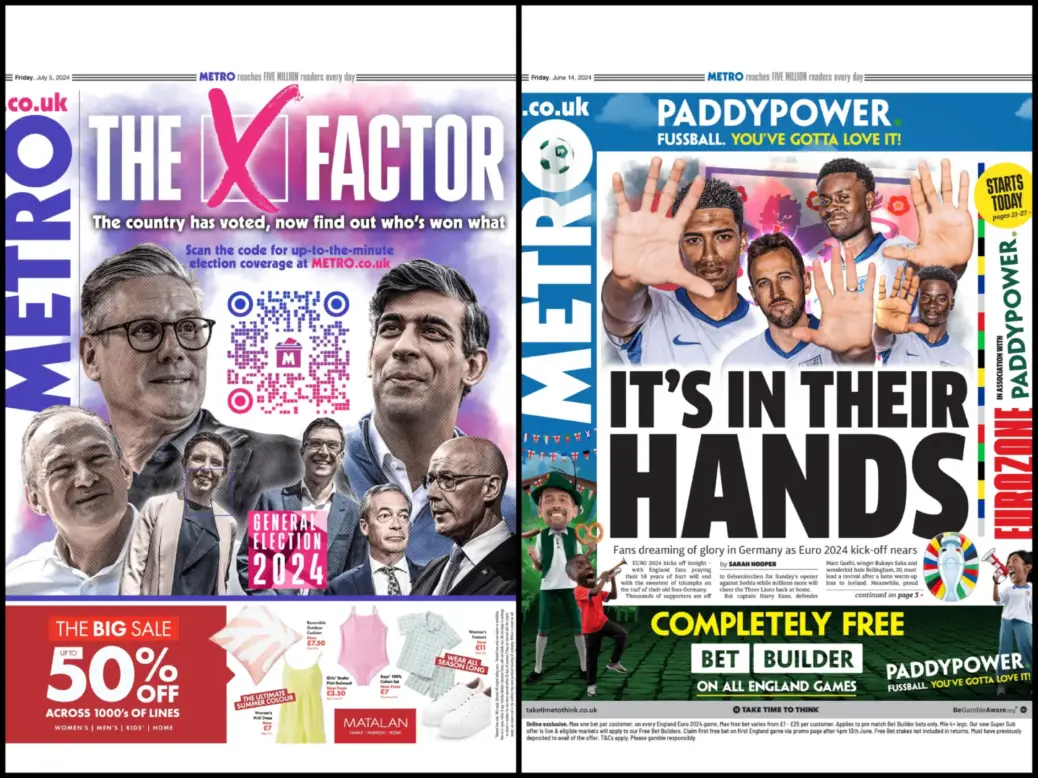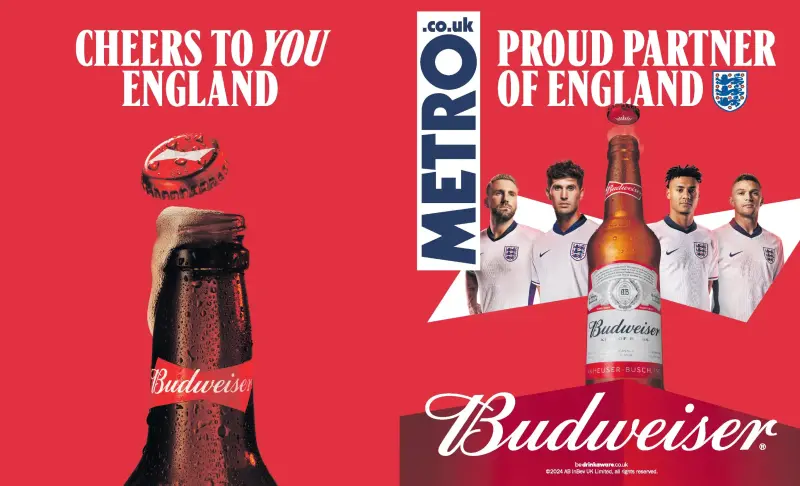
Bosses at Metro have told Press Gazette the free newspaper is now profitable in both print and digital showing there is life yet in free dailies.
In March 2023 Metro underwent a major restructure to deal with financial losses deemed “in no way sustainable” following the Covid-19 pandemic, advertising downturn and increases in newsprint, fuel and ink costs. Meanwhile, the Evening Standard is currently moving from daily to weekly distribution in response to six years of losses.
The Metro newsroom was restructured to create one editorial team for print and online led by editor-in-chief Deborah Arthurs, resulting in a number of redundancies and departures including former newspaper editor Ted Young.
Owner DMG Media’s commercial arm Mail Metro Media, which also deals with ad sales for the Mail brands, the i, The Telegraph and the New Scientist, created one ad sales team for the whole portfolio but also a separate team working alongside it which is dedicated to Metro.
In an interview at DMGT’s Kensington office on Tuesday, Metro managing director Richard Thomson and commercial director Jo Mazenko told Press Gazette the brand has had a “very positive journey for the last 18 months”.
Thomson said: “I think what’s made the difference is the commercial team have really worked out how to sell Metro, how to give it a different identity to traditional newsbrands that operate across print and digital and in apps and then on social media, in such a way that we’ve really been able to grow market share considerably, grow revenue considerably. And I think that’s what’s made the big difference. We’ve just relearnt how to tell a brilliant story about this brilliant brand.”
Asked what that Metro identity and USP is, Mazenko said: “We give the people what they want. We don’t take ourselves too seriously when appropriate. I think it’s Metro’s role to provide the UK with access to free, impartial and trustworthy news. But it’s news and entertainment.”
Thomson added: “And we have both scale and quality. So we reach five million people every day and it’s an incredibly valuable audience… that are on the go in the morning, regardless of whether they work in the hospitality sector, or whether they’re captains of industry, they are going to work and they’re spending money.”
In May, Metro was the eighth biggest news website in the UK with an audience of 16.1 million, according to Ipsos iris, following an increase of 17% year-on-year – the largest growth among the top ten sites.
It has also revamped its social strategy, increasing website page views from social by 20% compared to the previous three-month period, reaching 73 million in March to June. Last week it was shortlisted for the website of the year prize at the Press Gazette Future of Media Awards.
But Thomson and Mazenko said print is staying strong too. Its ABC circulation was 951,294 in June, a figure it has hovered around since January 2023. It maintained that reach by expanding distribution with bus companies Metroline and Stagecoach in London.
Almost half (47%) of its distribution is done on buses, which Mazenko noted are more strike-proof than the trains and also let advertisers get close to shops on the high streets, with 29% at rail terminals and 17% at London Underground stations. Metro has editions in Merseyside, the Midlands, North East, North West, Scotland and Yorkshire centred around the bigger cities.
Wi-Fi and WFH: Metro says it’s holding strong amid changing commutes
The Evening Standard, Metro’s direct competitor as a free newspaper in London albeit distributed later in the day, announced at the end of May it will drop its daily print edition to go weekly. It will initially drop its Monday and Friday editions from 2 August.
The Standard partly blamed “shorter commuting weeks” and “widespread Wi-Fi along our commuting routes” for the decision.
But Mazenko said neither are factors currently affecting Metro.
She said Wi-Fi on the tube “doesn’t really faze us, because there’s been Wi-Fi on the underground since 2012 and the majority of our distribution is not underground anyway”.
Asked about 4G and 5G mobile signal, with most people able to browse the internet on buses and overground trains as well as the London Underground gradually adding mobile connectivity to the tube network, Thomson added that people switching between Metro and their phone is “just a supplementary part of their morning routine”.
Mazenko described Metro as “snackable news – we’re not the be-all and end-all” and Thomson added that he sees people on the afternoon commute pull out the morning Metro they saved from earlier in the day to do the puzzles.
This is why, he revealed, Metro is “going to dial up our investment in puzzles, because we know it has huge pickup credentials, so why wouldn’t we support it more?”
Of working at home habits, Mazenko said it has been a key job of the Metro commercial team to explain to advertisers that many people have returned regularly to the office post-Covid.
“Unfortunately, media and advertising are probably the last industry to be going back full time,” she said. “We know that over 50% of our audience never work from home. And we’ve had a really big job educating our customers, because in their minds, they work from the office maybe two or three days a week. 31% are hybrid. And only 15% always work from home.”

Metro monitors TfL data on public transport usage and said bus and Tube usage is 15% down compared to June 2019.
Thomson also noted that Metro’s one million print distribution is still only a “tiny percentage” of “the number of people that move through the environment that we operate in” across the UK’s major cities, meaning there is still plenty of opportunity even if commuter numbers are down.
Free London business newspaper City AM last year ended its Friday print edition in response to workers in the Square Mile preferring to end the week at home. But Mazenko said Metro’s distribution is the same each weekday as overall people do commute across the week (in fact, Thomson later added, the Friday circulation is the highest because it stays in the bins throughout the weekend).
“This is another thing we get asked all the time: ‘no one commutes on a Monday or Friday?'” Mazenko said. “Well, they do, and we’ve got all the data to back it up.”
Last year then-editor Young said “bus and rail strikes have certainly not helped us” when setting out Metro’s losses. But Thomson said this week: “It’s very infrequent that we will have a difficult conversation with our advertising partners because of strike action because of the very diverse nature of our distribution.
“So if TfL are striking, we still have an enormous reach across buses and trains. If the trains are striking, we still have enormous reach across the buses and the underground, so it allows us to weather those difficult storms with a compelling response that’s accurate.”
Writing ‘less, better’ content
Overall, Thomson said revenues are “substantially up” in 2024 compared to 2023 when they “made all of the necessary changes to put the business onto a sustainable financial footing”.
And Metro in both print and online is now profitable (although they report together financially).
“And with the news regarding the Evening Standard, one of our new USPs is going to be we’re the only daily newspaper operating in London shortly, sadly… and therefore, we absolutely believe that it can go from strength to strength as a platform, whilst we invest in the 360 publishing environment that we operate in.”
He teased plans to relaunch the Metro website in the autumn, with the help of its first dedicated product manager, and to grow its presence in both long and short-form video and audio.
Metro has already invested in its social video team, he said, with the aim of building a strong audience while grappling with how to monetise it.
Its six Tiktok accounts have 620,000 followers in total with more than one billion views since the start of October, of which almost a quarter (226 million) were in June alone.
Metro has also invested in its audience team which Thomson said has “allowed us to get under the skin around what content works for our audience.
“Everybody purports to be winning the strategy of writing less, better content, but from the data that we see on a daily basis, it really feels like we are beginning to turn a corner on that ambition. And we are writing less content than we have done in a long time but our page view growth is really impressive, which means we’re writing more better content for our audience, in the areas that they want to consume on our platforms.”
Online revenue growth has come as a result of this page view increase leading to “solid growth in open marketplace programmatic advertising and direct advertising where we’re winning business directly with agencies and clients for our website, not dissimilar to how we win business for the newspaper”, Thomson said.
It is also coming from people reading Metro content on MSN (through a deal for the amount of views generated by its content on the platform) and on Apple News (publishers can sell advertising including video ads around their content on the platform or get a cut of ads from Apple’s own backfill partners if the space goes unsold).
“It’s a really attractive audience,” Mazenko said of Apple News. “We’re seeing really good engagement with the ads that we are serving. So with our native package that we run on Metro.co.uk, we’ve been able to double the views by using Apple News So it’s a really exciting space for us.”

But print remains an area of innovation too, Mazenko said, with commercial sales through the new Metro 360 strategy moving away from just “static adverts” to include new ad formats, branded podcasts and experiential add-ons such as Halo character Master Chief giving out copies of the Metro with its first ever “mirror board” cover wrap bought by streaming service Paramount+.
These premium campaigns, also including new ad formats like C-shapes on the front page, are leading to print revenue growth alongside traditional display campaigns, Thomson said. Every day of the week of this interview had a cover wrap booked in.
Metro newspaper: ‘We are genuinely on the right trajectory’
Metro is also gearing up to announce a partnership that will see it include more entertainment content to make the most of its presence on Fridays and across the weekend.
Meanwhile last week Metro announced a partnership with Mediaforce’s package to advertisers of 39 regional daily titles. Mediaforce managing director Scott Gill explained in a statement: “The Metroforce proposition will be the new entry point into printed news media for clients and brands. It will offer bigger, broader reach than any other printed news offering; with unmatched coverage of towns and cities big and small. Watch this space for the companion digital solution to this innovative new tie-up.”
Asked for her most valuable lessons from the period since last year’s relaunch, Mazenko said: “From my side, I would say, the biggest lesson really is we’ve learned that we need to evolve, we can’t rest on our laurels and just sit still, even for a day, because there’s always something new. We’ve had to educate pretty much all of our clients and agencies that people are commuting again and the value of our audience and our product.
“But I think one of the biggest lessons is just how collaborative that we are internally. The chairman’s [Lord Rothermere] supportive, Deborah Arthurs is amazing, her door’s always open.”
Thomson concluded: “I think the thing that excites me the most about Metro is that we’re going to prove to the business and the marketplace that year one post-relaunch wasn’t a fluke, and we can do it again.
“We are genuinely on the right trajectory, both from a top line point of view with our revenues and because our cost base is the right cost base for the business that we run, and that makes us sustainable.”
Email pged@pressgazette.co.uk to point out mistakes, provide story tips or send in a letter for publication on our "Letters Page" blog
